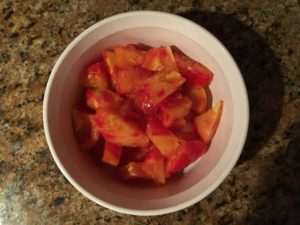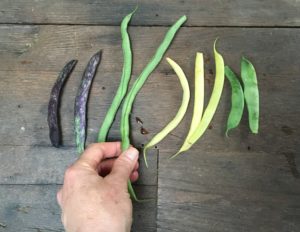Hello Fellow Readers,
This time of year, what fun it is to peruse seed catalogs. Green beans aren’t only green anymore. And tomatoes come in all sorts of shades and mottled blends of colors. There are even tomatoes that stay green when they’re ripe. Charlotte of Stone Church, PA, asked if the funky vegetables are genetically modified. Indeed, there’s much confusion over genetically modified versus heirloom versus hybrids. Then there are organic seeds to consider.
There’s a growing concern over genetically modified foods. In 1999 the Safe Seed Pledge, sponsored by The Council for Responsible Genetics (a non-government non-profit), began with nine seed companies. Now a hundred seed companies pledge that they “do not knowingly buy, sell, or trade genetically-engineered seeds or plants.”
GMO versus Hybrid Seeds
Genetically modified (GMO) means organisms with genetically changed cells (the DNA), including crossing species. The goal is to improve resistance to pests and diseases, increased nutrients, and reduced spoilage, which all sounds positive. But the elephant in the room is the initiative to change the genetic makeup of crops to be resistant to herbicides. You may know that Monsanto invented genetically modified crops resistant to their popular glyphosate herbicide Roundup. In other words, your corn, soybeans, wheat, and other edibles may include a hefty dose of synthetic herbicide. No, thank you.
Hybrids, conversely, are a cross-pollination of two different varieties of plants from the same species. It’s a process that happens in nature, though plant breeders intentionally cross-pollinate plants to improve characteristics such as disease resistance, color, fruit sizes, or improved taste and yields. And hybrids accomplish all of these good things without being genetically modified.
Heirloom and Organic Seeds
Some define heirloom seeds as those open-pollinated (by wind or insects) that date back 40 to 50 years; others say before World War II, which began in 1939. One universal meaning of heirlooms is – because they are open-pollinated seeds, they can be collected from the parent plant year to year and produce the same characteristics, unlike hybrids or GMOs.
Organic seeds are grown following the USDA’s National Organic Program (NOP), which doesn’t allow synthetic pesticides and fertilizers, sewage sludge (biosolids), or fresh manure. They must be non-GMO. Many heirlooms can be organic, as they came before synthetic fertilizers and pesticides.
Funky Seeds can be Organic.
It’s a long answer to Charlotte’s question. In a nutshell, funky veggies can be organic and even heirlooms. And while genetically modified seeds and food don’t have to labels saying they are, you can seek out those labeled “non-GMO.” I’ve always been a fan of combining veggies in flower beds. Now with all the fun colors to be had, vegetables surely can add to the display and be wholesome to eat.
Garden Dilemmas? Askmarystone@gmail.com
Last season I was thrilled to receive an assortment of goodies from Dennis of Blairstown, whose bountiful veggie garden always delights. Dennis shared, “There are seven kinds of beans in the mix: Rattlesnake pole beans, Italian red pole beans, Fortex long pole beans, Yellow wax bush beans, Italian flat bush beans, Green bush beans, and Galopka Polish yellow bush beans.” How pretty! And delicious.




